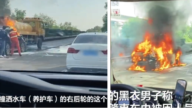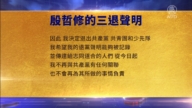【新唐人2014年04月23日讯】上海海事法院日前在浙江嵊泗马迹山港口,对被告——日本商船“三井株式会社”的一艘28万吨商轮(BAOSTEEL EMOTION),作出“扣押抵赔”的裁决。原告香港陈氏家族经过四代77年的努力,终于得到官方的支持,执行赔偿。这也是中国民间向日本索偿获胜的第一案。中共当局多年打压民间向日本要求赔偿侵华战争的损失,为什么现在突然出手支持呢?让我们一起去看一看。
据了解,1936年,日本“大同海运株式会社”要求中国浙江宁波船王——陈顺通,租借两条商用轮船“顺丰”和“新太平”号,租期为一年,当时还向日本保险公司投保。但第二年日本侵华,两艘商船被日军征用。抗战胜利后的 1947年,陈顺通向日方索船,得知两船都在战争中沉没。陈顺通临终时要求儿子陈恰群继续向日索赔。
陈家第二代陈恰群,1958年自上海迁居香港,继续跟日本“大同海运株式会社”打官司。而“大同”每次都以人事变动和船只为日本政府夺去、应由日本政府负责等回应。1974年,东京法院以追诉时效过期为由,判陈恰群败诉,陈家为此官司花费了60万美元。陈恰群1992年去世时也未完成先父遗愿。
陈家第三代陈震、陈春接棒,1988年向上海海事法院提起诉讼,律师团包括中、港、台和美国等律师56人,律师团人数创下民事案记录。
“大同海运”后来并入“三井株式会社”。2007年,法庭一审判决“三井”败诉,被告不服,上诉、申诉都被驳回,但一直不执行判决。今年4月19号,上海海事法院出手扣船抵押。陈氏家族经过四代77年的努力,终于获得赔偿。
同属原告的陈家第四代陈中威20号向媒体表示:他们当天刚安葬了父亲,他想他父亲在天之灵知道这个结果一定会很高兴。
陈氏家族成功向日索赔第一案,同时也是中共建政后首例得到官方支持的民间对日索赔案。因为多年来,中国民间对日本侵华期间,强迫中国人做劳工和慰安妇,所提起的多起诉讼案,都遭到北京的打压。
大陆法律学者、维权律师庄道鹤:“这个是秉承上层意思,对日施压。目前在国内政治形势、经济形势压力很大的情况下,(中共当局)有目地的在转移视线,制造一些兴奋点、焦点。要振奋民族精神,让大家把注意力指向到日本去。”
众所周知,德国是两次世界大战的侵略方。仅对1918年结束的第一次世界大战,德国就按照《凡尔赛合约》必须赔偿330亿美元。这笔赔偿金到2009年,德国仅差5,600万欧元没有赔偿。而日军侵华,中共不仅不索赔,而且第一任党魁毛泽东,1970年代会见日本当时的首相田中角荣时,还公开表示“感谢日本侵华”。
旅德极权主义问题专家仲维光:“毛泽东对于日本的感谢,的确是发自他内心的。在抗日战争的时候,他的主要精力在于扩张共产党的势力。直到今天,中共也是不许抗日战争的真相让民众知道,在封锁那些个真相。”
曾亲眼目睹日军飞机从头上飞过的81岁云南籍老人余永庆认为,日本应该赔偿中国及亚洲其他被侵略的国家。当时,余永庆还目睹了中国大量的逃难同胞们,挣扎在死亡线上。
中国云南籍老人余永庆:“它是主动发动战争,别的国家人的生命、财产或者其他的一切所受到的损失,它当然应该赔偿。这个是无论到什么地方,道理都是相通的。至于说毛泽东没有要求赔偿,是他自己的责任。我们老百姓不同意,我们要求赔偿的,我们不同意他。”
日本从1931年“九一八事件”后入侵中国东北三省,1937年7月7号“卢沟桥事变”,日本全面侵华,直到1945年9月9号,日本才正式向中国“国民党政府”宣布无条件投降。8年抗日战争,20万到30万以上中国人,遭遇“南京大屠杀”,而战争的悲剧还有﹕日军731部队用中国人做细菌实验、重庆被大轰炸、被迫的中国慰安妇等。
据公开的史料记载,中共当时的内部方针却是“七分发展(共产党)、二分应付、一分抗日”。
采访编辑/唐音 后制/舒灿
Four-Generation Long Chinese Civil Lawsuit Against Japan Receives Compensation
Shanghai Maritime Court has ordered
the seizure of a 280,000-ton cargo ship.
The ship, Baosteel Emotion, is owned by Mitsui OSK
Lines, and is currently in Majishan port, Zhejiang.
This court ruling came after four generations
of effort during the past 77 years.
It marks the first civil claim of compensation
against Japan since World War II.
After so many years of suppressing civil claims, why
did the Chinese Communist Party (CCP) change its
attitude towards Japanese aggression during the war?
Let’s see our report.
In 1936, the Mitsui OSK predecessor Daido Kaiun
chartered two vessels from Chung Wei Steamship Co.
The lease was for one year, and was under insurance.
However, the following year, war erupted, and both
ships were appropriated by the Japanese government.
In 1947, when the war ended, the ships
owner Chen Shuntong demanded their return.
He subsequently learned that both ships
had been lost at sea during the war.
Prior to his death, Chen told his son to
retrieve the loss of the ships from Japan.
Chen’s son, Chen Qiaqun continued the lawsuit when
he moved from Shanghai to Hong Kong in 1958.
Daido Kaiun responded that the Japanese
government ought to be responsible for the loss.
In 1974, Tokyo court declared Chen lost the
case because the statute of limitations had expired.
Chen Qiaqun spent US$ 600,000 on the
lawsuit before he passed away in 1992.
He was unable to complete his late father’s wishes.
The third generation of the Chen family,
Chen Zhen and Chen Chun once again filed
the lawsuit in Shanghai Maritime Court in 1988.
They involved a world record 56 lawyers from
China, Hong Kong, Taiwan, and the United States.
Daido Kaiun later became Mitsui OSK Lines.
In 2007, the court ruled had Mitsui lost the case.
The defendant appealed and repealed. The appeal was
dismissed, but there was no enforcement of the verdict.
On April 19, the Shanghai Maritime Court
finally ordered the seizure of the cargo ship.
The Chen’s family lawsuit of four generations
and 77 years finally recieved compensation.
The fourth generation of the Chen family, plaintiff
Chen Zhongwei, spoke to the media on April 20.
They had just buried his father that day,
and he believes his father is very happy.
The Chen’s case was the first to have won against
Japan over losses incurred during World War II.
It is also the first case the CCP has ever granted
support for against Japan’s aggression during WWII.
For many years, lawsuits have been brought
against Japan for it’s actions during wartime
This includes forced labor and sexual slavery cases, but
these cases have been constantly suppressed by Beijing.
Zhuang Daohe, attorney: “This is to pressure
Japan, and was instructed by the central regime.
Under international pressure in politics and the economy,
it serves to divert the focus and create some excitement.
Now, the national spirit is stimulated to target Japan."
As the aggressive party, Germany was left with debts of
US$ 33 billion after WWI, according to Treaty of Versailles.
Up to 2009, Germany still has EUR 56 million in debts.
After the Japanese invasion of China, the
CCP claimed no compensation from Japan.
Its first leader Mao Zedong even openly expressed
gratitude to Japan’s invasion of China in a 1970s
meeting with then Prime Minister Kakuei Tanaka.
Zhong Weiguang, expert in totalitarianism: “Mao Zedong
was indeed wholehearted about his gratitude toward Japan.
In the Sino-Japanese War, his main focus was
the expansion of the Communist Party forces.
Even today, the CCP is still blocking this fact, and
would not allow the Chinese people to learn this fact."
Yu Yongqing, from Yunnan Province, remembers
witnessing Japanese planes flying over into China.
81-year-old Yu believes that Japan should
compensate China and other countries in Asia.
Yu Yongqing also witnessed a large number of Chinese
compatriots fleeing their homes, and near death.
Yu Yongqing: “Japan initiated the war.
Of course it should compensate for the loss of lives
and properties of other countries. It is a universal rule.
It is also Mao Zedong’s self-claim of demanding
no compensation. We, as the people, do not agree.
We demand compensation. We do not agree with Mao."
Japan invaded Northeast China in 1931,
known as the Manchurian Incident.
The Marco Polo Bridge Incident on July 7, 1937
marks the beginning of the second Sino-Japanese war.
The war lasted until September 9, 1945 when Japan
formally declared unconditional surrender to China.
During the 8 years of war, more than 200,000 to
300,000 Chinese people faced the tragedy of war.
This included the Nanjing Massacre, the notorious
Unit 731 experiments on Chinese people, the
bombing of Chongqing, and forced sexual slavery.
Historical records reveal the then internal policies
of the CCP forces during the Sino-Japanese war.
70% were focused on the development
of the Chinese Communist Party.
20% were focused on fighting against the KMT,
and only 10% for fighting against the Japan.
Interview & Edit/Tang Yin Post-Production/Shu Can






























